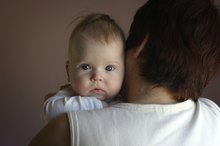What does fact checked mean?
At Healthfully, we strive to deliver objective content that is accurate and up-to-date. Our team periodically reviews articles in order to ensure content quality. The sources cited below consist of evidence from peer-reviewed journals, prominent medical organizations, academic associations, and government data.
The information contained on this site is for informational purposes only, and should not be used as a substitute for the advice of a professional health care provider. Please check with the appropriate physician regarding health questions and concerns. Although we strive to deliver accurate and up-to-date information, no guarantee to that effect is made.
Signs Your Baby Is a Dwarf
Parents of small babies often wonder if there are signs and symptoms of dwarfism 1. Knowing what to look for can help you determine whether or not your baby is a little on the small side, or showing signs of one of the more than 200 medical disorders that can cause dwarfism 1. Always alert your pediatrician to any health question that concerns you. Dwarfs are prone to health problems that aren't as prevalent in the general population, like heart problems and brain aneurysms.
Types
There are two types of dwarfism 1. Disproportionate dwarfism, also called skeletal dysplasia, occurs when the patient has some small body parts and some regular-sized body parts. Most commonly, the arms and legs will be small, while the head and trunk tend to be the same size as others in their age group. Proportionate dwarfism occurs when all parts of the body are simply small 1.
Hormonal Dwarfism
Extra Skin Folds & Eye Problems in Infants
Learn More
On standard pediatric growth charts, a height below the fifth percentile can indicate dwarfism. Generally, this is caused by a deficiency in human growth hormone. HGH tells the body when to grow and how much to grow. Lack of HGH is the cause of most cases of proportionate dwarfism 1.
- On standard pediatric growth charts, a height below the fifth percentile can indicate dwarfism.
- Lack of HGH is the cause of most cases of proportionate dwarfism 1.
Early Symptoms of Turner Syndrome
Excess skin at the neck of a newborn combined with puffy hands and feet during infancy are the earliest symptoms of Turner Syndrome, a disorder that results in short stature 1.
Early Symptoms of Skeletal Dysplasia
Breast Bud Development Signs
Learn More
Clubfoot--twisted or misshapen fee--can be an early sign of disproportionate dwarfism 1. As part of the newborn examination, and during the first year well-baby checks, doctors will be looking for disorders such as this, as well as hip deformities that can hinder proper growth.
Potential
Dwarfism doesn't often affect a child's cognitive abilities; there are only a few dwarfism-related conditions that would affect a child's ability to mature into adulthood and care for himself, albeit with physical challenges and adaptations.
Related Articles
References
- Symptoms of Dwarfism
- Barstow C, Rerucha C. Evaluation of Short and Tall Stature in Children. Am Fam Physician. 2015;92(1):43-50.
- National Center for Advancing Translational Sciences. Genetic Rare Diseases Information Center. Dwarfism. Updated May 19, 2011.
- Pauli RM. Achondroplasia: a comprehensive clinical review. Orphanet J Rare Dis. 2019;14(1):1. doi:10.1186/s13023-018-0972-6
- Lin S, Li C, Li C, Zhang X. Growth Hormone Receptor Mutations Related to Individual Dwarfism. Int J Mol Sci. 2018;19(5). doi:10.3390/ijms19051433
- Merker A, Neumeyer L, Hertel NT, Grigelioniene G, Mohnike K, Hagenäs L. Development of body proportions in achondroplasia: Sitting height, leg length, arm span, and foot length. Am J Med Genet A. 2018;176(9):1819-1829. doi:10.1002/ajmg.a.40356
- National Library of Medicine. Achondroplasia. In: Genetics Home Reference. Bethesda, MD: The Library; 2012.
Writer Bio
Lisa Russell has been a writer since 1998. She's been published in Rethinking Everything Magazine, Playdate, AERO and Home Educator's Family Times. She has a Bachelor of Science in business marketing management and a professional background in marketing, education, cosmetology and hospitality.








